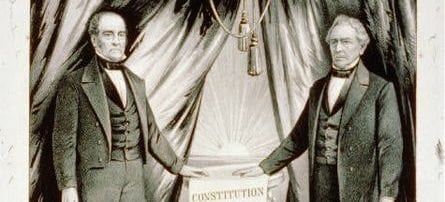My dear Sir:
Your letter, mentioned in your two telegrams, has not reached me; so that I am without knowledge of its particulars. I beg you to pardon me for having concluded that it is not best for me now to write a general letter to a political meeting. First, I believe it is not customary for one holding the office, and being a candidate for re-election, to do so; and secondly, a public letter must be written with some care, and at some expense of time, so that having begun with your meeting, I could not well refuse others, and yet could not get through with all having equal claims. Please tender to those you represent my sincere thanks for the invitation, and my appeal to their indulgence for having declined their re-quest.
Yours very truly.
A. LINCOLN.
Editor’s note: Lincoln’s original draft of this letter differs from the version he posted to Schermerhorn in significant ways. We include the draft version below.
Isaac M. Schemerhorn
My dear Sir.
Yours inviting me to attend a Union Mass Meeting at Buffalo is received. Much is being said about peace; and no man desires peace more ardently than I. Still I am yet unprepared to give up the Union for a peace which, so achieved, could not be of much duration. The preservation of our Union was not the sole avowed object for which the war was commenced. It was commenced for precisely the reverse object — to destroy our Union. The insurgents commenced it by firing upon the Star of the West, and on Fort Sumpter, and by other similar acts. It is true, however, that the administration accepted the war thus commenced, for the sole avowed object of preserving our Union; and it is not true that it has since been, or will be, prossecuted by this administration, for any other object. In declaring this, I only declare what I can know, and do know to be true, and what no other man can know to be false.
In taking the various steps which have led to my present position in relation to the war, the public interest and my private interest, have been perfectly parallel, because in no other way could I serve myself so well, as by truly serving the Union. The whole field has been open to me, where to choose. No place-hunting necessity has been upon me urging me to seek a position of antagonism to some other man, irrespective of whether such position might be favorable or unfavorable to the Union.
Of course I may err in judgment, but my present position in reference to the rebellion is the result of my best judgment, and according to that best judgment, it is the only position upon which any Executive can or could save the Union. Any substantial departure from it insures the success of the rebellion. An armistice — a cessation of hostilities — is the end of the struggle, and the insurgents would be in peaceable possession of all that has been struggled for. Any different policy in regard to the colored man, deprives us of his help, and this is more than we can bear. We can not spare the hundred and forty or fifty thousand now serving us as soldiers, sea-men, and laborers. This is not a question of sentiment or taste, but one of physical force which may be measured and estimated as horse-power and Steam-power are measured and estimated. Keep it and you can save the Union. Throw it away, and the Union goes with it. Nor is it possible for any Administration to retain the service of these people with the express or implied understanding that upon the first convenient occasion, they are to be re-inslaved. It can not be; and it ought not to be.








































































































































































































